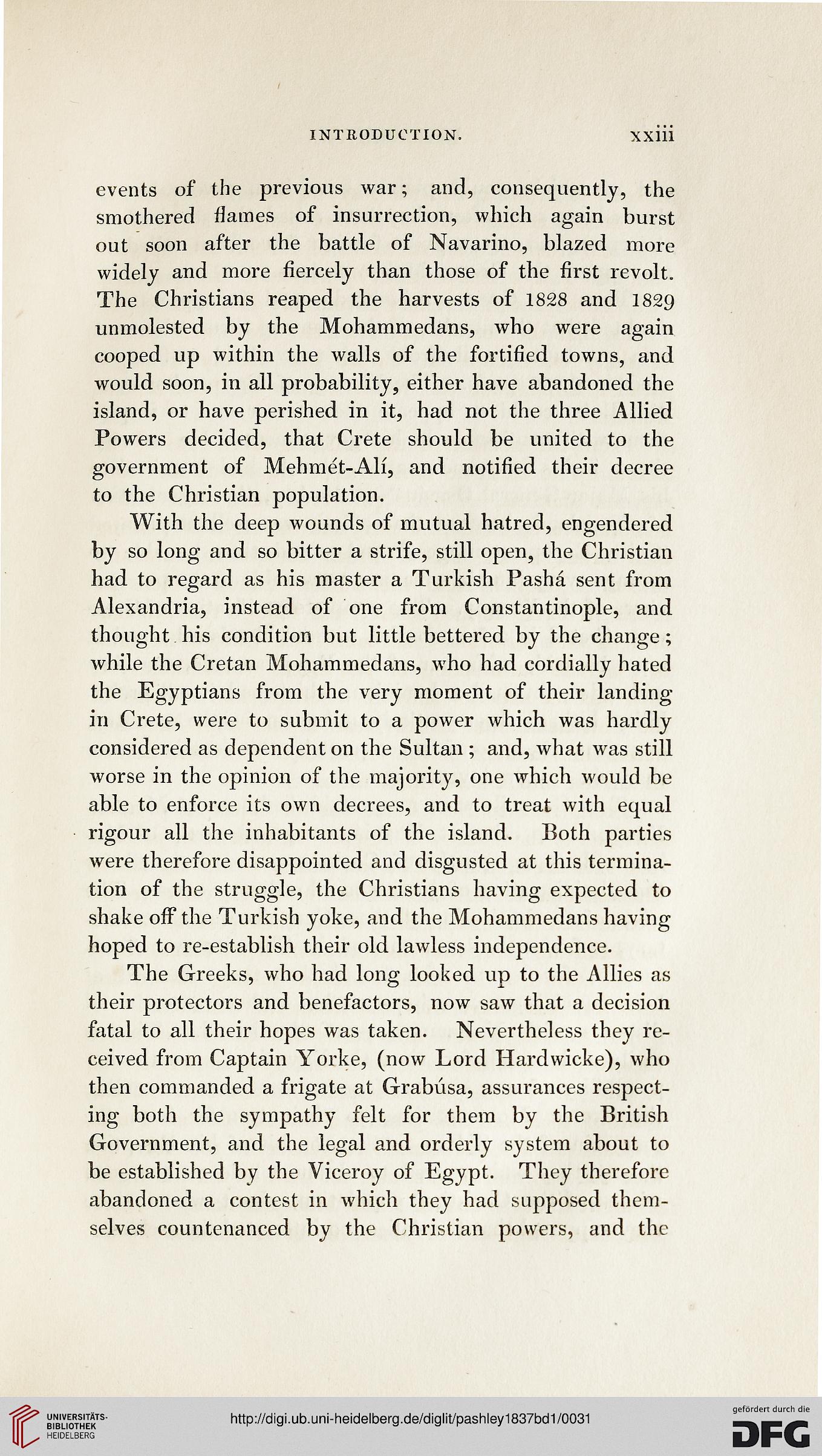INTRODUCTION.
XX111
events of the previous war; and, consequently, the
smothered flames of insurrection, which again burst
out soon after the battle of Navarino, blazed more
widely and more fiercely than those of the first revolt.
The Christians reaped the harvests of 1828 and 1829
unmolested by the Mohammedans, who were again
cooped up within the walls of the fortified towns, and
would soon, in all probability, either have abandoned the
island, or have perished in it, had not the three Allied
Powers decided, that Crete should be united to the
government of Mebmet-AK, and notified their decree
to the Christian population.
With the deep wounds of mutual hatred, engendered
by so long and so bitter a strife, still open, the Christian
had to regard as his master a Turkish Pasha sent from
Alexandria, instead of one from Constantinople, and
thought his condition but little bettered by the change;
while the Cretan Mohammedans, who had cordially hated
the Egyptians from the very moment of their landing
in Crete, were to submit to a power which was hardly
considered as dependent on the Sultan ; and, what was still
worse in the opinion of the majority, one which would be
able to enforce its own decrees, and to treat with equal
rigour all the inhabitants of the island. Both parties
were therefore disappointed and disgusted at this termina-
tion of the struggle, the Christians having expected to
shake off the Turkish yoke, and the Mohammedans having
hoped to re-establish their old lawless independence.
The Greeks, who had long looked up to the Allies as
their protectors and benefactors, now saw that a decision
fatal to all their hopes was taken. Nevertheless they re-
ceived from Captain Yorke, (now Lord Hardwicke), who
then commanded a frigate at Grabusa, assurances respect-
ing both the sympathy felt for them by the British
Government, and the legal and orderly system about to
be established by the Viceroy of Egypt. They therefore
abandoned a contest in which they had supposed them-
selves countenanced by the Christian powers, and the
XX111
events of the previous war; and, consequently, the
smothered flames of insurrection, which again burst
out soon after the battle of Navarino, blazed more
widely and more fiercely than those of the first revolt.
The Christians reaped the harvests of 1828 and 1829
unmolested by the Mohammedans, who were again
cooped up within the walls of the fortified towns, and
would soon, in all probability, either have abandoned the
island, or have perished in it, had not the three Allied
Powers decided, that Crete should be united to the
government of Mebmet-AK, and notified their decree
to the Christian population.
With the deep wounds of mutual hatred, engendered
by so long and so bitter a strife, still open, the Christian
had to regard as his master a Turkish Pasha sent from
Alexandria, instead of one from Constantinople, and
thought his condition but little bettered by the change;
while the Cretan Mohammedans, who had cordially hated
the Egyptians from the very moment of their landing
in Crete, were to submit to a power which was hardly
considered as dependent on the Sultan ; and, what was still
worse in the opinion of the majority, one which would be
able to enforce its own decrees, and to treat with equal
rigour all the inhabitants of the island. Both parties
were therefore disappointed and disgusted at this termina-
tion of the struggle, the Christians having expected to
shake off the Turkish yoke, and the Mohammedans having
hoped to re-establish their old lawless independence.
The Greeks, who had long looked up to the Allies as
their protectors and benefactors, now saw that a decision
fatal to all their hopes was taken. Nevertheless they re-
ceived from Captain Yorke, (now Lord Hardwicke), who
then commanded a frigate at Grabusa, assurances respect-
ing both the sympathy felt for them by the British
Government, and the legal and orderly system about to
be established by the Viceroy of Egypt. They therefore
abandoned a contest in which they had supposed them-
selves countenanced by the Christian powers, and the




